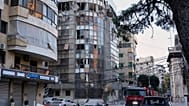Already low, the purchasing power of Albanians is likely to be battered due to the destabilisation of markets by the war in Ukraine and sanctions against Russian aggression.
Thousands of people demonstrated in Tirana on Saturday against rising fuel prices, which have gone up more than 40% domestically in one week.
 ADVERTISEMENT
ADVERTISEMENT
 ADVERTISEMENT
ADVERTISEMENT
This is the fourth day of massive protests that have affected several cities in this Western Balkan country, where the average monthly salary is reported to be around 490 euros.
Already low, the purchasing power of Albanians is likely to be battered by price increases due to the destabilisation of markets by the war in Ukraine and sanctions against Russian aggression.
Gathered in the central Skanderbeg Square in downtown Tirana, the crowds marched to the seat of government, holding up placards and chanting slogans against the cabinet of Prime Minister Edi Rama.
A small group of demonstrators marched to the police station to seek the release of dozens of people who had been arrested in previous protests.
The protesters also marched in several other towns, including Lezha in the north, where a group of demonstrators briefly blocked traffic on a national road.
Priced at 180 lekë (€1.5) at the pump before the Russian invasion of Ukraine on 24 February, a litre of diesel now costs up to 290 lekë (€2.37).
The demonstrators are calling for lower taxes and aid programmes to cushion the blow to low-income households.
The government responded by adopting a "social resistance package" on Saturday afternoon, but it still kept the mandatory taxes on crude oil products.
On Friday, Rama had already promised to intervene in selling petroleum products to prevent "any speculation". The traders' margins should be capped, while prices at the pump will be set daily.
Moments after the end of Saturday's protest, Rama offered a cash handout to pensioners and vulnerable groups. He also pledged to cut income tax for more than half of all private and government sector employees.
But protesters said they would continue to stage daily demonstrations because they say the government's move to reduce fuel prices doesn't go far enough.
The surge in fuel prices has been followed by a surge in food prices, which are currently hitting record highs on the world market due to limited supply, made worse by Russia's invasion of Ukraine.
Both countries are major exporters of agricultural commodities, particularly wheat. The Ukrainian government has already banned the exporting of wheat to combat food shortages at home.














